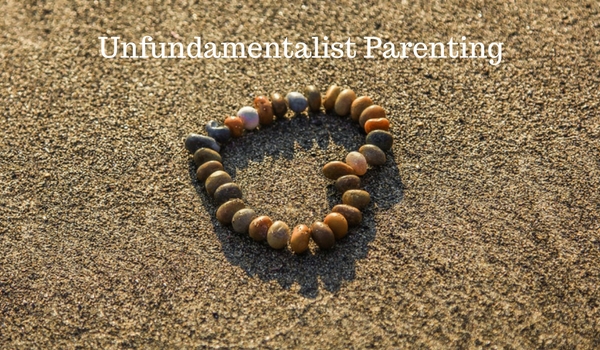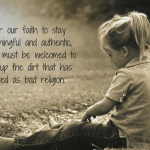
Image: Pixabay
I’ve been convicted that wearing a safety pin, or joining a Facebook group, or posting messages of support on social media while potentially helpful, are not enough to overcome the battles ahead of us. We must prepare to love our neighbor in the face of potential opposition over the next several years. But I know why we resort to “salcktivism” as it’s been called: It’s because we’re unsure what else to do.
It’s not for a lack of desire to stand up or speak out or march on, but it is because we are on one hand overwhelmed, and on the other hand ill-equipped. There is so much need and yet we feel paralyzed and unsure where or how to begin. This isn’t news to those who have been fighting and organizing their entire lives and careers, but for many of us it’s an unusual feeling: a fire in our soul without resources to channel it.
This post is to provide some concrete ideas for families and individuals on how to stand up, speak out, and march on. I have committed to DOING one thing each day – between now and inauguration day (and, likely, beyond) – to help create a more just and loving world.
I hope they inspire you to do good – and please add your own ideas ~ nothing is too big or too small.
- What does your local mosque need? This top-of-mind for me, since Muslims were the victims of some of the worst campaign rhetoric, and since our neighborhood mosque is just a few blocks over from where I live. It is also the site where this happened: A woman and her son took to the sidewalk to create chalk murals outside the mosque with messages of validation, love, and support – and the whole neighborhood joined in. Think about opportunities for you and your kids to engage in simple yet profound acts of love and support. But it’s not just about the mosques. Unfortunately, also a few streets over in my neighborhood, a Methodist church was vandalized with a swastika. The church and its members need creative imaginings of support and solidarity, too.
- What do your immigrant communities need? I live in Nashville, a community with a large refugee and immigrant population. World Relief has a wonderful program here, developed to support high-school age refugees. My students have been working with these kids all semester and now, more than ever, we are reminding ourselves to ask questions, to listen to stories, and provide a safe place when bullying and xenophobia rear their heads.What similar organizations serve your city? There are people who have long been doing this work, who will likely need an extra dose of support and an extra set of hands. Working with immigrant students or families and involving your children can be a powerful way to wake our kids up to the experiences of many who are different from us. I know my students have been moved by their time spent with World Relief this semester.
- How can you serve the under-served? This is broad. What are the needs in your community? Where do your passions and gifts lie? For me, it means partnering with a pre-school in a low-income neighborhood to build relationships with their kids through reading to them, playing games with them, and giving my time and resources.How can you be the hands and feet of Love? Maybe this means serving the homeless population (a growing need as temperatures drop); maybe this means working with at-risk youth. An organization in Nashville, Room in the Inn, provides lists of ways families can address homelessness and treat the homeless with dignity. They’re ideas we can all take into our communities – I plan to turn my toddler’s artwork into placemats for them to use at their center to brighten up the tables.
- Where can you hold our leaders accountable? I’m talking the future president through all levels of government, and – yes – even within our churches. If you want to involve your kids, have them write letters of their own or make their own phone calls. My daughter’s a little young for that, but I am confident that as I model peaceful, holy resistance, she will assimilate this into her understanding of what it means to live with conviction.
- Where can YOU stand up and lead? My husband and I have very different skills and strengths. We both love to dream and plan our life with intention, but when it comes to implementation he tends to lead in big-picture thinking, and I tend to lead by herding us along toward our goals through day-to-day implementation. Not surprisingly, this is reflected in how we’ve responded to the election. He is talking of think tanks, and funding, and political office: a broad, long-term vision for changing the world. I, on the other hand, went right to my church to see where and how we could better educate people about what it looks like to live out our calling as Christians.How can YOU and your family bend the moral arc of the universe toward justice in your own communities and spheres of influence? The one thing I pray for my family every night is that we be guided into the work only WE can do in the world. We all have things no one else can do but us – what’s yours?
- Be UN-fundamentalist! Of course, there’s a piece of this point in every item on the list so far. I believe that (one of the reasons) this election happened the way it did is because it’s so easy to “otherize” everyone.Of course, my gut reaction is to remove myself – and definitely my innocent, impressionable daughter! – from extremism and anyone who thinks differently from me. But when I’m honest with myself, this reaction is the very thing I’m fighting against. This is fundamentalism – though the targets may be different than what most of us associate with fundamentalism.Our tendency to behave this way leaves us in a vacuum. We’re not surrounded with diversity of ethnicity, belief, and practice so we don’t have to wrestle with the implications our decisions have for those who aren’t like us. This has to stop.
I hope this list can provide a good place to start as we work to put our faith into action – and we cannot let ourselves slip into complacency. It’s up to us. May we not grow weary of doing good.
Alexis James Waggoner is a theologian and educator. She teaches at Belmont University and is the founder of The Acropolis Project (http://theacropolisproject.com), an organization dedicated to raising the bar of theological education in communities of faith. She also serves as a chaplain in the Air Force Reserves and is passionate about ministering to women in places where they are often marginalized. She has an M.Div from Union Theological Seminary in New York, a husband of 12 years, and a baby named Junia.
https://www.facebook.com/theacropolisproject/
@alexisjwaggoner
@acropolisproj
Sign up here to get updates on Unfundamentalist Parenting.
Join our Facebook Group, Raising Children Unfundamentalist.












